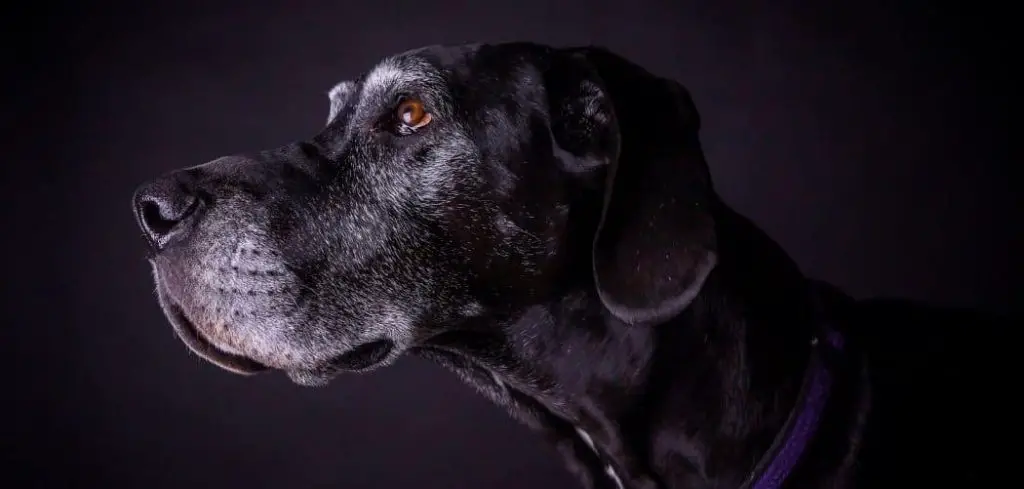Panting and pacing in an old dog can be distressing to witness, especially when it seems excessive or happens without an obvious reason. These symptoms may signal underlying health conditions that need attention.
We outline the common causes of excessive panting and pacing in an old dog, what you can do at home, and when to seek veterinary help.
Old Dog Excessive Panting and Pacing — Why It Happens
Excessive panting and pacing in older dogs usually point to discomfort, pain, or an underlying medical issue. Conditions like heart disease, arthritis pain, heatstroke, cognitive decline, and anxiety are among the most common culprits.
Some dogs may also show these behaviors due to medication side effects or hormonal imbalances.
When an older dog suddenly seems restless and breathless, it’s often a signal that something more serious is at play and needs veterinary evaluation.

Old Dog Excessive Panting and Pacing: Common Causes
Heart Disease
Heart disease is a common condition in older dogs and can lead to panting and pacing as the heart struggles to pump blood efficiently.
The lack of proper circulation causes shortness of breath, restlessness, and sometimes coughing. Dogs may pace because they feel uncomfortable lying down or cannot catch their breath easily.
This condition is serious because it can progress quickly, and untreated heart disease often leads to heart failure.
Read more: Old Dog Panting Excessively at Night (What it means)
Pain from Arthritis or Other Conditions
Arthritis is one of the leading causes of discomfort in senior dogs. Pain can cause pacing as the dog tries to find a comfortable position, and panting is a natural response to stress and discomfort.
Older dogs may also pant excessively due to pain from other sources, such as cancer, injuries, or internal disease.
This type of panting is often persistent and does not resolve even when the dog is at rest.
Heatstroke or Overheating
Older dogs are more vulnerable to overheating, even in mildly warm conditions. Excessive panting is the body’s attempt to cool down, and pacing may follow because the dog feels unsettled and distressed. Unlike younger dogs, seniors have a harder time regulating body temperature. This makes overheating a potentially life-threatening cause of excessive panting and pacing.
Anxiety or Canine Cognitive Dysfunction (Dog Dementia)
As dogs age, anxiety and cognitive decline can become more noticeable. Dogs with canine cognitive dysfunction often pace at night, seem restless, and pant for no clear medical reason.
This condition is similar to dementia in humans, and it can leave dogs disoriented, unable to settle, and increasingly anxious.
Panting paired with pacing in these cases often occurs during nighttime hours when dogs should normally be sleeping.
Medication Side Effects
Certain medications, such as corticosteroids, can lead to increased panting and restlessness in dogs.
If an old dog suddenly begins pacing and panting after starting a new prescription, this could be the cause.
While not always dangerous, side effects should be reported to the veterinarian to rule out more serious reactions or to adjust dosage.
Hormonal Disorders (Cushing’s Disease)
Cushing’s disease, caused by excessive cortisol production, is fairly common in older dogs.
It leads to panting, increased thirst, frequent urination, and pacing. The high hormone levels disrupt normal body functions, making dogs restless and uncomfortable.
Without treatment, this condition progresses and may severely affect a dog’s quality of life.
What to Do If Your Old Dog Is Panting and Pacing Excessively
When an old dog begins panting and pacing excessively, first try to make the environment as calm and comfortable as possible.
Ensure the dog is in a cool, quiet room, away from direct sunlight or loud noises. Offering fresh water and a soft, safe space to rest may help reduce stress.
If you suspect pain, consult with your vet about pain management options. Gentle massage, orthopedic bedding, and joint supplements may provide relief.
For dogs showing nighttime pacing, keeping a consistent routine and using calming aids like pheromone diffusers may help.
If medications are suspected to be the cause, do not stop them abruptly but discuss adjustments with your veterinarian.
When to Call or Visit Your Vet
Veterinary attention is necessary when panting and pacing are sudden, severe, or accompanied by other symptoms such as coughing, vomiting, collapse, or refusal to eat or drink.
Breathing that seems labored or noisy, or restlessness that lasts for hours, should also prompt a vet visit.
If your dog appears disoriented, weak, or is unable to settle down, these are warning signs of serious health problems.
Because older dogs are more vulnerable, even mild symptoms should not be ignored. Prompt veterinary care can mean the difference between manageable treatment and life-threatening complications.
Read more: Old Dog Panting and Drinking Lots of Water (Here’s why)
Key Takeaway
Excessive panting and pacing in an old dog is never something to overlook. Whether it stems from heart disease, pain, overheating, anxiety, or hormonal imbalance, the symptoms are a clear sign that the dog is struggling.
Creating a calm home environment may help in the short term, but veterinary care is essential to address the underlying cause.
With timely attention and proper support, many senior dogs can find comfort and relief, even as they age.
